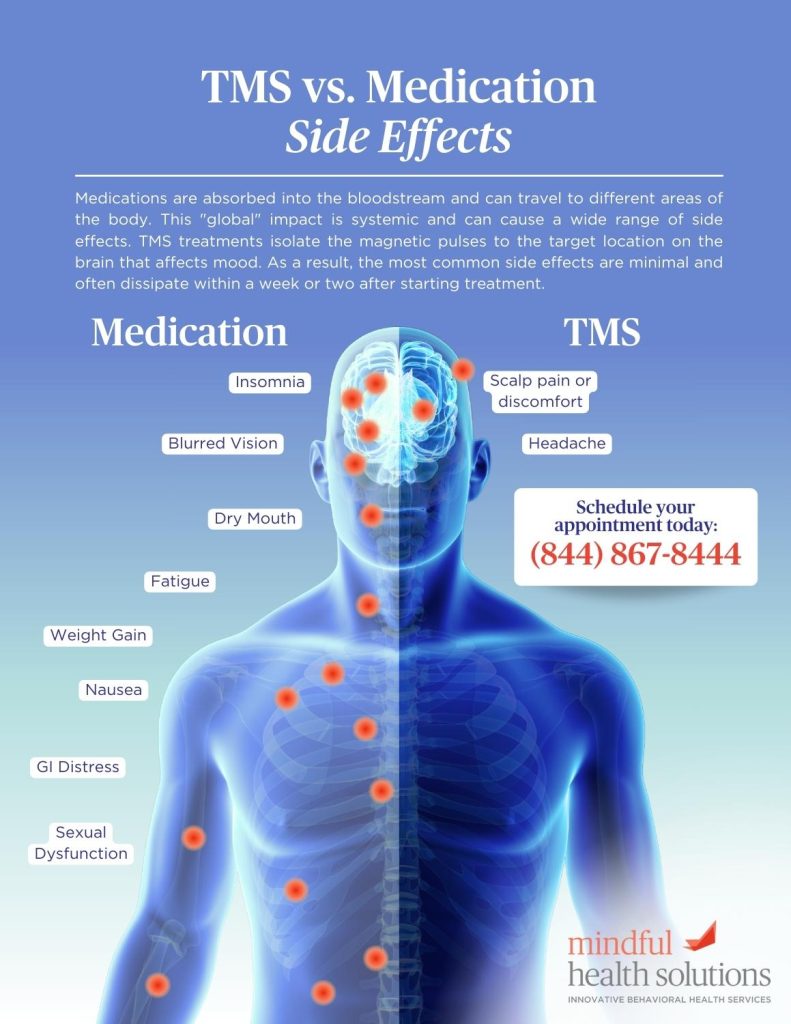Ever felt like your treatment for depression isn’t hitting the mark? You’re not alone. According to the World Journal of Psychiatry, antidepressants don’t improve symptoms in 10–15 percent of people with depression and only partially improve symptoms in 30–40 percent. Well, science has a magnetic answer for you—Transcranial Magnetic Stimulation (TMS). This treatment aims to fine-tune your brain’s neural activity without the side effects often associated with medications.
Why should you care? Understanding your options is crucial when it comes to mental health, especially when experiencing an antidepressant failure. Depression is a complicated condition, and finding the right treatment can be a challenging journey. TMS offers a fresh, scientifically-backed alternative that has shown promising results, especially for those who haven’t found success with medications.
What is TMS?
Transcranial Magnetic Stimulation (TMS) is an effective treatment option that targets the prefrontal cortex of your brain, which is the area that regulates mood. TMS is particularly suited for people with mental health conditions who haven’t responded well to medications and/or antidepressants in the past.
Breaking it down, “Transcranial” means through the skull, “Magnetic” refers to the magnetic fields used, and “Stimulation” speaks to the activation of brain cells. Combined, TMS serves as a non-invasive procedure aiming to reset specific areas of the brain responsible for mood, with extremely limited side effects compared to traditional medications.

The Brain’s Control Center: The Prefrontal Cortex
The prefrontal cortex is essentially the captain of your emotional ship. When it’s off-kilter, you may experience a range of mood disorders, including depression. TMS directly targets this area, aiming to get the captain back in command.
Located behind your forehead, the prefrontal cortex plays a crucial role in mood regulation. Numerous studies have linked irregularities in this region to mood disorders like depression, making it a logical focal point for treatments like TMS.
How Does TMS Work as a Depression Treatment?
TMS therapy uses magnetic pulses to stimulate neurons in the prefrontal cortex. This activity triggers the release of neurotransmitters like serotonin and dopamine—often dubbed the “feel-good” chemicals. One in two patients treated with TMS experiences a 50% reduction in symptoms, and about 30% experience full remission.
Moreover, TMS enhances the brain’s plasticity, and its ability to form new connections. This leads to longer-lasting changes in mood regulation, making TMS a sustainable option for those who have struggled with traditional treatments.
Is TMS for you? Learn more about eligibility and effectiveness.
The Connection to Depression
Depression is often the result of a neurotransmitter imbalance. TMS works to reset this balance, providing substantial relief. Unlike antidepressants, which can produce various side effects and don’t work for everyone, TMS therapy shows better results with minimal, short-term side effects.
Mental health treatments aren’t one-size-fits-all. That’s why it’s crucial for patients to maintain open communication with healthcare providers. At Mindful Health Solutions, our expert providers will collaborate with you to create the best treatment plan for your specific needs.
TMS vs. Other Depression Treatments
Antidepressants and therapy have their place in treating depression, but TMS offers a more direct approach to influencing brain chemistry. It can take up to six weeks to experience the full benefits, but most patients start seeing improvement after two to three weeks. TMS therapy can often be administered in conjunction with other depression treatment options, such as psychotherapy or ongoing medication management.
The side effects of antidepressants, like weight gain and fatigue, can be discouraging, even more so when an antidepressant not working is making depression worse. TMS, with its short list of mild, temporary side effects, becomes an attractive alternative for those who haven’t had success with medications or are concerned about medication side effects.
Check out the pros and cons of TMS for depression.
Real-life Success Stories of TMS as a Depression Treatment
Real people have found real relief through TMS. Many patients who have undergone TMS treatment for depression have reported positive experiences. Patients have reported improvements in their mood and overall quality of life. Additionally, many patients appreciate the non-invasive nature of the treatment and the fact that there are few side effects.
Watch the video below to learn about one of our past patient’s experience with TMS treatment.
Action Steps for Considering TMS as a Depression Treatment
If you’re interested in TMS, consult with a mental health professional for personalized advice. Mental health treatment plans require individualized approaches. TMS can often be part of a comprehensive treatment plan that may include medication or therapy. The collaboration between patient and provider can significantly impact the success of a treatment plan.
Typically, consultation involves a detailed medical history. If TMS is deemed appropriate, you’ll receive a tailored treatment regimen focused on long-term improvement in your quality of life.
TMS stands out as a promising, science-backed approach to treating conditions like Major Depressive Disorder. Its focus on the prefrontal cortex and its proven ability to stimulate neurotransmitter release make it a long-lasting solution for many who haven’t had success with traditional methods or are concerned about medication side effects.
Are you experiencing an antidepressant failure and are interested in trying TMS? Give us a call today at (844) 867-8444 to schedule a consultation and see if TMS could be an option for you. Remember, you’re not alone, and there’s always hope for a brighter tomorrow.

